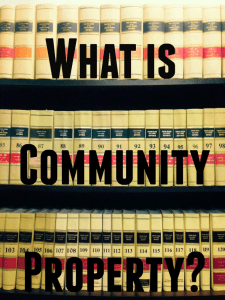 Here at ACMB, we’ve noticed an increasing number of readers are relatively new to San Antonio, and perhaps to Texas and its community-property system. And, the Supreme Court’s recent Obergefell decision means that Alamo City moms who enter same-sex marriages will become subject to the same rules that historically have applied to opposite-sex marriages. So, the topic of community property certainly is timely, and now is as good a time as any to help all of our married readers understand, in general terms, how the Texas community property system applies to them.
Here at ACMB, we’ve noticed an increasing number of readers are relatively new to San Antonio, and perhaps to Texas and its community-property system. And, the Supreme Court’s recent Obergefell decision means that Alamo City moms who enter same-sex marriages will become subject to the same rules that historically have applied to opposite-sex marriages. So, the topic of community property certainly is timely, and now is as good a time as any to help all of our married readers understand, in general terms, how the Texas community property system applies to them.
What is the community property system?
The community property system is one of a variety of marital property systems. Like all marital property systems, it governs property ownership between spouses. It creates a marital estate (not all marital property systems do), and governs what property is included in that estate, how that property is managed, and—perhaps most importantly—how that property will be divided and inherited when the marriage ends by death, annulment, or divorce.
What states use a community property system?
In the United States, the community property system was inhertied from Spain, by way of Mexico. As a result, most community property states are in the American West. They are: Washington, Idaho, California, Nevada, Arizona, New Mexico, Texas, Louisiana, and (outlier) Wisconsin. Alaska permits couples to opt-in to a community property system. Puerto Rico also is a community property jurisdiction. While the rules may vary from state to state, if you were married in or lived in one of the aforementioned places before moving to San Antonio, the general principles discussed here applied. This post is specific to the community property rules in Texas.
What is the community property system in a nutshell?
In a community property system, property acquired during the marriage (except for gifts and inheritance) is owned by the community estate (rather than by either spouse individually). In Texas, when the marriage ends (by death, annulment, or divorce), the community estate is subject to “just and equitable” division. “Just and equitable” does not always mean 50/50.
What property is community property?
In Texas, all property is community property unless it is a spouse’s separate property.
A spouse’s separate property is:
- Money or property the spouse owned before marriage;
- Money or property the spouse acquired during the marriage by gift or inheritance; or
- Money or property the spouse received as a recovery for personal injuries sustained by the spouse during marriage.
In short, property held by either spouse during the marriage is presumed to be community property unless it can be shown by “clear and convincing” evidence that it falls into one of the separate-property categories described above or that the spouses agreed to make it separate property.
Texas also uses a “tracing” principle: if an asset was acquired with separate funds (or with proceeds from the sale of a separate asset), and the spouse claiming separate ownership can trace the separate ownership with “clear and convincing evidence,” the property is separate property.
The following outcomes result from these rules:
- Each spouse’s salary or wages is community property.
- Earnings from separate property (such as rental income from the house one spouse bought before the marriage) is community property.
- Prior to marriage, Spouse A saved a significant amount of money. The couple used the money to purchase a house after marriage. Assuming Spouse A can “trace” the down payment as separate property, the house is Spouse A’s separate property (although Spouse B might have homestead rights and rights arising from the community estate’s contribution to the purchase or maintenance/improvement of the house).
Why does this matter?
If a couple starts out with (and stands to inherit) very little, remain married until one partner dies, do not have children with any other person, and do not have tax or debt problems, the distinction between community and separate property might not ever be relevant. However, one needs to think about the following scenarios (and others):
- If I receive an inheritance from a relative and I have children, if I were to die, do I want that inheritance to go to my children, or to my spouse as community property? If I don’t mind it going to my spouse, how do I feel about it being shared with children born from my spouse’s second marriage?
- If my spouse and I divorce, do I have “clear and convincing” evidence that the property I brought into the marriage is my separate property such that my spouse is not entitled to a share of it? Or, does my spouse have “clear and convincing evidence” that a significant portion of property is his/her separate property such that I would not be entitled to a “just and equitable” portion of it upon divorce?
- If my spouse earns income that is not reported on our joint income tax return (for example, if my spouse is gambling, day-trading, or picking up side work without my knowledge), am I liable for a portion of the underpayment?
Can my spouse and I opt out of the community property system?
Yes. Prior to marriage, a couple can enter a premarital agreement allowing property either acquires during the marriage to become separate property. After marriage, they can enter an agreement to cause community property to become separate or separate property to become community.[hr]
The community property system has more nuances than what could be covered in a non-technical blog post. If you need advice specific to your situation, contact an attorney.*
*Lauren McLaughlin, a finalist in our recent Amazing Moms competition, is smart as a whip and deals with community property issues regularly.











